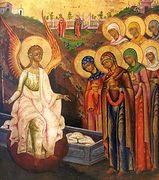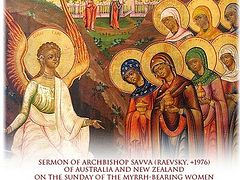Why, my brethren, were the holy Myrrh-Bearing Women and the Righteous Joseph and Nikodemos vouchsafed such a great honor that their memory is now celebrated by the Church just after the celebration of the Resurrection of the Lord? Did they, during the earthly life of the Lord or after His Ascension into Heaven, take a special part in the great work of His ministry for the salvation of mankind? Neither in Scripture nor in Tradition do we find anything about it. Tradition testifies only about St. Mary Magdalene, that she later became a preacher of the Gospel, like the Lord’s Disciples, for which she received the title “Equal-to-the-Apostles.”
Or perhaps the holy people now venerated by the Church were distinguished by some special understanding of the mysteries of the Kingdom of God, or a special abundance of spiritual gifts? We don’t see this at all in the Gospel story. On the contrary, it was said to St. Nikodemos directly: Art thou a master of Israel, and knowest not these things? (Jn. 3:10), and these words remain in the Gospel for our edification.
Finally, perhaps the holy persons celebrated today were distinguished at least by constantly being with the Lord, that is, perhaps they heard all His talks, were present at all His miracles, and participated in all the needs and hardships and shared in all the labors and dangers of His ministry? This can’t be said based on the Gospel, for we only see one time when Nikodemos comes to listen to the Savior’s teaching, at night, for fear of the Jews (Jn. 19:38). More is said about the holy Myrrh-Bearing Women—that they followed Jesus from Galilee (Mt. 27:55) and ministered unto Him of their substance (Lk. 8:3). But this coming to Christ certainly wasn’t a constant thing, and the women’s ministry to the Lord from their own possessions also wasn’t a constant thing. Otherwise, there wouldn’t have been any need for the Lord to ask His Disciples: Whence shall we buy bread? (Jn. 6:5). Moreover, there wouldn’t have been any need, in another case, to turn to a miraculous catch of fish, to take a coin out of its mouth to pay the Temple tax (Mt. 17:27).
What, I repeat, could have drawn the Church’s attention to the holy Myrrh-Bearing Women and the Righteous Joseph with Nikodemos so as to honor their memory with a special feast, immediately after the celebration of the Resurrection of the Lord? It was their love and zeal for the Lord Jesus, manifested in the simplest way. With Joseph, it’s the benevolent boldness with which he entreated Pilate for Jesus’ body for burial, giving the buried One his own tomb; with Nikodemos, it’s the amicable zeal with which he brought so many precious oils and linen cloths to the burial of the Teacher; with the holy Myrrh-Bearing Women, it’s their courageous presence at Jesus’ Cross on Golgotha, their participation with Joseph and Nikodemos in His burial, and finally, their morning journey to the tomb of the Life-Giver with sweet spices to anoint His Most Pure Body.
These are the feats of the holy persons now being honored by the Church! Undoubtedly, they didn’t stop there, but went further in faith and humility, ascended higher in love and self-sacrifice, and, perhaps, attained the heights of angelic purity. But leaving aside all their other perfections, the holy Church points not to any other qualities and virtues but those we have indicated above. And it can’t be said that the Church extended its gratitude to them beyond measure, when their memory is so solemnly remembered now for such apparently simple virtues; no, in this case it followed the example of the Lord Himself; for to whom did He first appear after His Resurrection? Not to the Apostles, but the holy women who came to Him with myrrh. And even before His death, at the supper, in the house of Simon the Leper, when Mary, the sister of Lazarus, poured out myrrh upon His feet, and when Judas treacherously regretted the use of this myrrh, He said approvingly that she hath wrought a good work, and that Wheresoever this Gospel shall be preached in the whole world, there shall also this, that this woman hath done, be told for a memorial of her (Mt. 26:10, 13). The holy Church is now fulfilling this prophecy and together with the commandment, making the zeal of the holy Myrrh-Bearing Women and the pious buriers of the body of Jesus known to the whole world through this present feast.
Why does the Church make it known throughout the whole world? First, in gratitude to them for serving the Lord at a time when He was abandoned by everyone, by His very Disciples; and second, to arouse in us a similar zeal for our Lord and Savior by the example of the Noble Joseph and the holy women. For although our Lord ascended into Heaven after His Resurrection, as we know, and sat down at the right hand of God the Father, and therefore has no need of help from us, our gifts and offerings, on the other hand, this same Lord of ours was pleased to be found among us tangibly, in our churches, in the Sacrament of His Body and Blood, and being thus present, He is well-pleased to be subject again to our hardships and needs, as He once was in the Bethlehem manger and in Joseph’s garden. He also needed a large upper room furnished (Mk. 14:15) for the Supper, a shroud for covering His Most Pure Body, and a tomb for burial. All these things could be arranged for Him in our churches by the Cherubim and Seraphim who are ever present at the sacred rites, but it’s not His good pleasure to accept this ministry from them. He grants this honor to us whom He redeemed by His Blood, and for whose salvation He is again offered in the bloodless Sacrifice. The holy Church reminds us all of the fulfillment of this sacred duty by this present celebration. Honoring Righteous Joseph and Nikodemos, it as if says to all men: “Look, imitate their zeal; don’t spare your temporary gains for the Lord; don’t miss precious opportunities to render help and service to Him Who promised a reward in the Kingdom for a cup of cold water given in His name.” Glorifying the holy Myrrh-Bearing Women, the holy Church as if says to all Christian women: “Look, don’t forget their good example, and use the abundance of your gains not to adorn yourselves, but to serve God and the Church, to do works of piety and Christian love.”
This lesson is heard and accepted by many; thus the wise intention of the holy Church in the present celebration continues to be achieved even now, as in ancient times, as testified to by many of our churches, whose existence and splendor are due to nothing other than the zeal and generosity of Christ-loving souls. It’s impossible to behold without special emotion how many of the poorest people donate, like the Gospel widow, practically their last mite for the needs of the churches of God. Peace and blessings to you, good and simple souls, on behalf of the Risen Lord! Amidst the darkness of night, you illuminate the face of your Savior and His saints depicted in icons; He, the Most Good One, will mark the light of His face upon you when you walk through the darkness of the shadow of death. You bring fragrant incense to be burned before His holy altar; He will remove the activity of the mortal corruption surrounding us in the tomb. You cover His nakedness in church, and He will cover you with the robe of His merits when you stand at the universal Judgment. Only, don’t stop, you good souls, with the gifts you bring, and don’t say with the Pharisees: I give tithes of all that I possess (Lk. 18:12), but try to prepare yourselves, that is, your hearts, for a living sacrifice, holy, acceptable unto God (Rom. 12:1).
Serving in this way for the joy of those who, like Joseph and the holy women, know how to serve the Lord from their own possessions, the present feast should at the same time, bring to their senses those who, having every opportunity to rend such services to their Lord, neglect this under various pretexts. What pretexts? Of the many I have heard, the main one is that the Lord demands our heart and not gifts, that the true sacrifice to God is a broken spirit and a broken and humbled heart. Well! This is the first thing our Lord demands of us, for it wasn’t for material gifts, but for our hearts that He descended from Heaven and ascended the Cross. But do external deeds of love and zeal for the holy Church prevent us from having such a spirit and such a heart? It is from such a spirit and heart that such deeds flow, such that the lack of them almost always testifies that we lack this good spirit and this precious heart.
In fact, what kind of broken spirit is it that, while erecting royal palaces for its own residence, calmly stands aside and allows a church of God to collapse? What kind of humble heart is it that, for all its impurity, considers itself so precious that instead of all other gifts, it dares to proudly put itself alone on the altar of God? If there is any inner contrition in such a man, it’s essentially that which consists of the ruins of the inner temple of God, of the poorest remnants of conscience and Christian feeling. If there is any inner humility in this instance, then it’s surely similar to what the wicked servant found in the Gospel parable, when instead of interest from the talent entrusted to him, he presented his fear of losing it by putting it to use. No, those who truly had a contrite spirit and humble heart behaved differently. Like David, they were ashamed and accounted it as sin that they, according to circumstances, happened to live in houses of cedar while the Ark of the Covenant remained under a tent, and took all possible measures to stop this obscenity.
It’s true that true worshippers shall worship the Father in spirit and in truth (Jn. 4:23), and that such worship can be offered in any place, not only in churches. However, while remembering this, we mustn’t forget that the Savior Himself, Who commanded this worship in spirit, never disregarded the Jerusalem Temple; and during His stay in Jerusalem, He was nowhere to be found so often as in the Temple. He saw all the rich adornments of this Temple and never once pronounced any condemnation against those who adorned it; on the contrary, He praised the zeal of the widow who brought her two mites as an offering to the Temple. After this, is it possible to allow yourself to be indifferent to the state of the churches of God?!
The holy Sacraments of the faith obviously couldn’t have chosen our dwellings for their habitation; for them, a sanctuary is needed; but a sanctuary, in turn, needs cleanliness, comfort, and sacred splendor. You who would like to confine yourselves to worshiping God in spirit and truth, and under this pretext relieve yourselves from zeal for the churches of God—will you remain calm in spirit if the foundation of the church begins to falter underneath you due to decrepitude, or if there be no solid covering over your heads, protecting you from the shifting winds? On the contrary, you’d be the first to demand not only comfort from the church, but also all the sacred splendor. Cease to be at odds with yourself; be inspired by the spirit of piety—not in words alone but in reality, and you won’t be unfeeling witnesses to the decrepitude and bareness of the church anymore; truly be imbued with the truth that the Savior demands from those who worship His Father, and this truth will open your eyes and show how far you are from fulfilling your duty.
For is it truth when everything in your home shines with artificial light, and the night turns into day, but in the churches of the Lord there’s no light before the icon of the Savior and His Mother? Is it truth when you stand before the sanctuary in rich clothes, made of materials collected from all corners of the world, and your Savior should come out before you in His Most Pure Mysteries barely covered with clothes, and moreover poor and shabby clothes? Is it truth when you receive His Most Pure Body and Blood from Him in church, but your zeal for Him is limited to those small mites that you usually give to the very least of the poor!
Thus, condemned by the truth for their coldness and lack of zeal for churches, some think to take refuge under the shelter of philanthropy. Rather than making offerings to dead churches, it’s better, they say, to use their excess to help living temples—that is, the lesser brethren of Christ, the poor. God grant that those who speak or think this way would act just as they say! Even now our Most Merciful Savior would renounce everything to benefit those for whom He poured out His Blood; He would go naked and hungry if only they were all clothed and filled. But there are many reasons to think that such philanthropy remains on the lips alone and is only a pretext.
Nevertheless, let us concede it in all its force and ask these benefactors of humanity why they want to be benefactors only of members of the body, while leaving the Head without help. For the Savior, as we have already noted, is still subject to privations and needs, being in our churches in His Most Pure Mysteries. Throughout His earthly life, He was only in one place in the flesh, but is now present in every church; therefore, He needs shelter everywhere, He needs clothing. Being present on Earth personally, He was surrounded by miracles, which exalted His Person and made Him an object of everyone’s respect, despite the poverty He was in.
Now there are no visible miracles around Him in church, and therefore external splendor is needed to express the internal majesty of the Sacraments. And will we, His followers and members of His Body, refuse Him this necessary service? Shall we refuse on the pretext that all our mercy and zeal for Him have been exhausted on His lesser brethren? Is there even a drop of sincerity in this? If we’re really sincere in this, then—allow me to say—we’re too irrational, vainly imagining that service to the Church isn’t service to mankind.
For does our neighbor consist of body alone, rather than body and soul together? Does he really have need of clothing, bread, and shelter alone, and not of a church, the Divine services, and the Sacraments? How can we show him mercy for the flesh but not show mercy even more so for the spirit, giving him the opportunity to be in church as often as possible, to learn the word of God there, and to rejoice in the sacred rites? Here, in our churches, erected or adorned by our zeal, the poor man will find what we’re unable to give him with all our means—that is, food for his heart and sanctification by the grace of the Holy Spirit. Even material help for bodily needs is nowhere so conveniently obtained by the poor as at church—for nowhere is the heart or hand so open to give alms to the poor as in church, after the services.
Amen.




